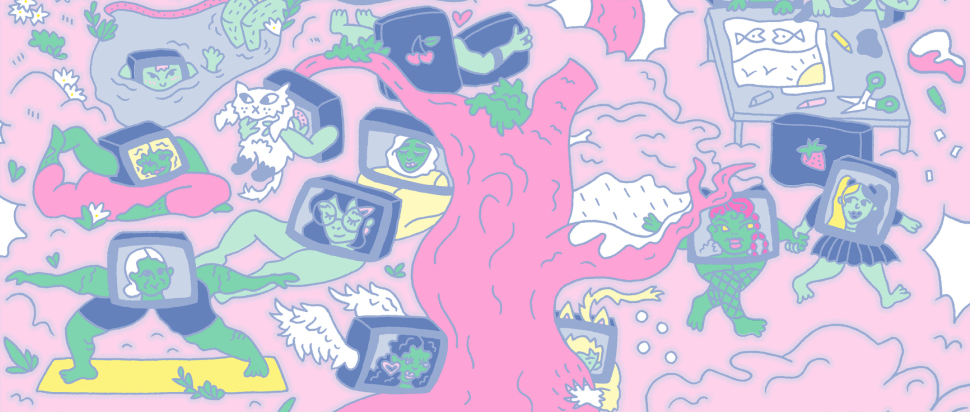Dardishi Festival on going online, zines & community care
Dardishi Festival goes online for its first digital festival at the end of June. We catch up with Dardishi’s founder Samar Ziadat to discuss the project’s origins, zine culture and building something new
When Samar Ziadat was at university and her sister was finishing school, they decided to start a small online platform called Dardishi, where Arab and North African women and non-binary people could publish their art, writing and films. “We started it because we felt like we weren’t being represented as Arab women in the media,” explains Ziadat. “Or, when we were, a certain narrative was being mediated through the lens of white people or men, both in the Arab and Western media.”
The small project suddenly began to snowball in popularity and reach as Arab and North African women and non-binary people across the world began contributing to Dardishi’s zines and community projects. Funding and a DIY ethos enabled an annual festival and year-round events as well as taking on a designer-in-residence.
At the end of June, Dardishi Festival goes online, with events, films and workshops that seem especially important given the global context of when the festival is taking place. This year’s programme was locked in before the most recent wave of violence in Palestine, but Ziadat hopes the festival’s free community care workshops can offer some comfort and a talk by the Palestinian Feminist Collective can provide education and action points. While every day brings a constantly changing climate, one thing that remains steadfast is the need for community and solidarity, something Dardishi has stood for since its origins in 2016.
How has the move from in-person to online events been over the last year?
Samar Ziadat: It’s actually been really rewarding because I feel like Dardishi has come full circle. We started out as an online platform and our connection to our community was digital before we started putting on events in person. Even though Dardishi is a Scottish-based project, from its inception we’ve had an international reach. So going online means we can connect with that audience that has always existed but has maybe been left out, particularly in the Middle East where 45% of our online following is based. The festival is primarily for Arab and North African women, and to connect with all of us – whether it’s diasporic communities spread across the world or people in our homelands – that’s been really rewarding.
Dardishi is rooted in DIY, zine culture. Why has that ethos been important to the project?
Zine and pamphlet making has always been about exploring niche topics, but from their inception, a central part of zines has been about sharing human experience and using them to talk about race, sexism, class and disability. Creating zines of my own and then putting together Dardishi zine was about putting forth an idea and trying to connect with people. Zines are traditionally given out for free or for a really affordable price and information is demographically disseminated. The internet felt like a perfect place for Dardishi zine and this year we made our zine available digitally to keep costs low so people could access it affordably.
This year’s festival programme feels like it really reflects Dardishi’s many communities, interests and ethos. How was putting together that programme?
Normally, we can’t afford to bring in international talent so this year’s programme is really exciting because we’ve got people based everywhere who are showcasing their work. The premise of the festival and the zine is the same: to connect with each other as Arab and North African women and non-binary people.
There are so many layers to what it means to be a person and, while being Arab and North African is central to our community and who we are, some of us are disabled, some of us are queer, some of us are asylum seekers, some of us are in exile, some of us are in our homelands, some of us are immigrants. There’s so much to every person and sometimes it can feel isolating even within your own community. Dardishi is about reaching out to one another and saying, “Hey I’m kinda weird too!”
It feels like, within Scotland, there’s been a recent surge in grassroots arts initiatives that have been set up apart from traditional institutions and led by the communities they serve. Is that something you’ve noticed over the last five years of organising Dardishi?
When the zine started it was about putting forth thoughts and ideas that we didn’t feel were out there in the void, whether that’s in television or journalism or mainstream publishing. Of course every community group, organisation and grassroots initiative is very different, but, for me, setting up Dardishi was a matter of necessity. Before I was running Dardishi, I worked at several art institutions in Scotland and, personally, I didn’t think I could survive working in traditional institutions or that I was really valued. And it’s not just me; people of colour in Scotland have been talking about this for a long time.
Starting Dardishi was about bringing together people who work in the arts and were treated in a similar way, and trying to do something different – and not just something that is defined by being the opposite of white institutions, but building something new from the ground up. This isn’t something we’ve just invented, it comes from a long history of grassroots organising that for generations has focused on the question of what if we burn it down and start again. That’s what I really hope people feel when they attend the festival.
Dardishi Festival takes place online 18-27 Jun
Tickets are available on a sliding scale, between £0-12. Find out more at dardishi.com/2021festival
